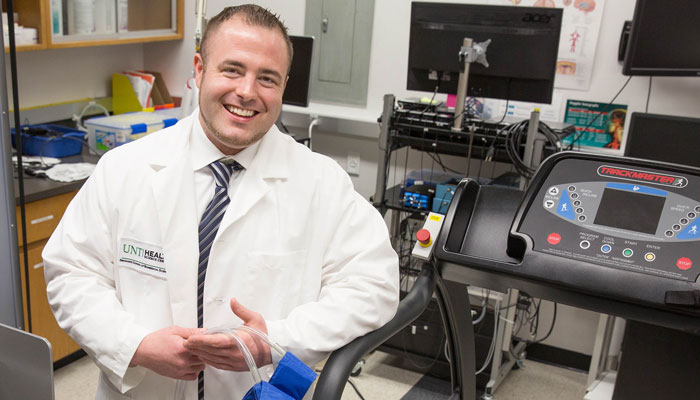From personal trainer to PhD candidate
By Justin Sprick, GSBS student

I was working as a personal trainer in my hometown of Odessa when an article caught my eye in The Journal of Strength and Conditioning Research.
It was about using blood flow restriction exercise, which uses inflatable cuffs to reduce blood to the working muscles, as a novel strategy to promote muscle growth.
I always had been fascinated by the science of exercise. I earned my undergraduate degree in kinesiology at the University of Texas at the Permian Basin and had just started working toward my master’s in exercise physiology.
So I ordered blood pressure cuffs and a portable lactate blood analyzer and experimented with them at the gym. Some friends and I would do different exercises wearing the cuffs and then measure things like which one gave us the biggest lactate response or resulted in the greatest perceived effort.
I look back now and laugh — it was a really cavalier way to do science. But it helped spark my interest in a career in exercise science research.
That interest led me to UNT Health Science Center, where I’m in the final year of my PhD program. I’m still exploring blood flow restriction exercise but for a different reason than helping clients build muscle in the gym.
I’m working with my mentor, Caroline Rickards, PhD, in the UNTHSC Cerebral & Cardiovascular Physiology Laboratory to determine whether blood flow restriction exercise could be adapted in a way to potentially help protect vital organs in people following a stroke or heart attack.
Specifically, we want to know if combining cycles of blood flow restriction to the limbs with rehabilitation exercises commonly performed by stroke or heart attack survivors – such as treadmill walking – could enhance the benefits of both treatments through an augmented release of protective factors in the blood.
So far, I’ve earned research grants from the Health Science Center and Texas Chapter of the American College of Sport Medicine. I also received a Society for Experimental Biology and Medicine’s Young Investigator Award and, most recently, a Ruth L. Kirchstein NRSA F31 Predoctoral Fellowship from the National Institutes of Health.
I am a long way from that gym in Odessa. But one of my favorite things about being a personal trainer was that I could use exercise to help people improve their quality of life.
I hope to achieve the same goal through my research.
***
Justin Sprick is a PhD candidate in the Cerebral & Cardiovascular Physiology Laboratory.


![Uyen Sa Nguyen Scaled[58]](https://www.unthsc.edu/newsroom/wp-content/uploads/sites/16/Uyen-Sa-Nguyen-scaled58-145x175.jpg)


Social media